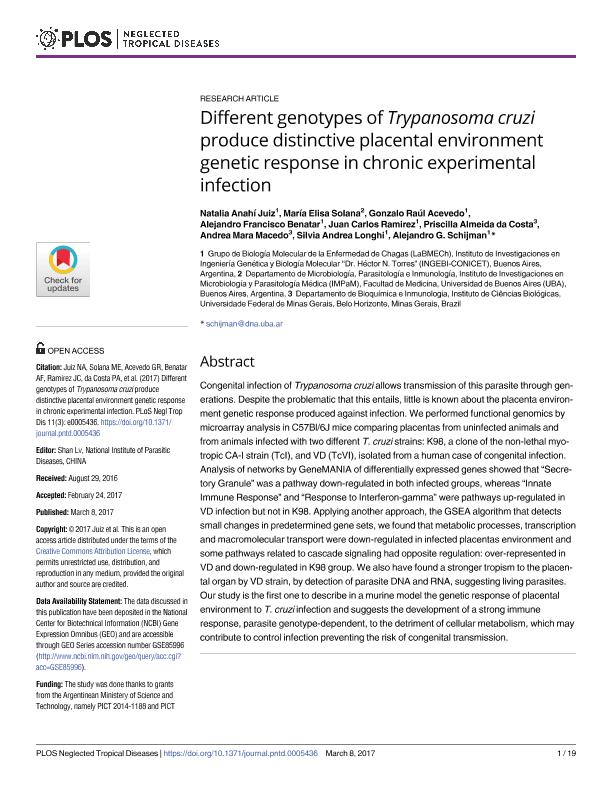Artículo
Different genotypes of Trypanosoma cruzi produce distinctive placental environment genetic response in chronic experimental infection
Juiz, Natalia Anahí ; Solana, Maria Elisa; Acevedo, Gonzalo Raúl
; Solana, Maria Elisa; Acevedo, Gonzalo Raúl ; Benatar, Alejandro Francisco
; Benatar, Alejandro Francisco ; Ramirez Gomez, Juan Carlos
; Ramirez Gomez, Juan Carlos ; Almeida da Costa, Priscilla; Macedo, Andrea Mara; Longhi, Silvia Andrea
; Almeida da Costa, Priscilla; Macedo, Andrea Mara; Longhi, Silvia Andrea ; Schijman, Alejandro Gabriel
; Schijman, Alejandro Gabriel
 ; Solana, Maria Elisa; Acevedo, Gonzalo Raúl
; Solana, Maria Elisa; Acevedo, Gonzalo Raúl ; Benatar, Alejandro Francisco
; Benatar, Alejandro Francisco ; Ramirez Gomez, Juan Carlos
; Ramirez Gomez, Juan Carlos ; Almeida da Costa, Priscilla; Macedo, Andrea Mara; Longhi, Silvia Andrea
; Almeida da Costa, Priscilla; Macedo, Andrea Mara; Longhi, Silvia Andrea ; Schijman, Alejandro Gabriel
; Schijman, Alejandro Gabriel
Fecha de publicación:
08/03/2017
Editorial:
Public Library of Science
Revista:
PLoS Neglected Tropical Diseases
ISSN:
1935-2735
Idioma:
Inglés
Tipo de recurso:
Artículo publicado
Clasificación temática:
Resumen
Congenital infection of Trypanosoma cruzi allows transmission of this parasite through generations. Despite the problematic that this entails, little is known about the placenta environment genetic response produced against infection. We performed functional genomics by microarray analysis in C57Bl/6J mice comparing placentas from uninfected animals and from animals infected with two different T. cruzi strains: K98, a clone of the non-lethal myotropic CA-I strain (TcI), and VD (TcVI), isolated from a human case of congenital infection. Analysis of networks by GeneMANIA of differentially expressed genes showed that “Secretory Granule” was a pathway down-regulated in both infected groups, whereas “Innate Immune Response” and “Response to Interferon-gamma” were pathways up-regulated in VD infection but not in K98. Applying another approach, the GSEA algorithm that detects small changes in predetermined gene sets, we found that metabolic processes, transcription and macromolecular transport were down-regulated in infected placentas environment and some pathways related to cascade signaling had opposite regulation: over-represented in VD and down-regulated in K98 group. We also have found a stronger tropism to the placental organ by VD strain, by detection of parasite DNA and RNA, suggesting living parasites. Our study is the first one to describe in a murine model the genetic response of placental environment to T. cruzi infection and suggests the development of a strong immune response, parasite genotype-dependent, to the detriment of cellular metabolism, which may contribute to control infection preventing the risk of congenital transmission.
Palabras clave:
Trypanosoma Cruzi
,
Placenta
,
Strains
,
Microarray
,
Strains
Archivos asociados
Licencia
Identificadores
Colecciones
Articulos(INGEBI)
Articulos de INST.DE INVEST.EN ING.GENETICA Y BIOL.MOLECULAR "DR. HECTOR N TORRES"
Articulos de INST.DE INVEST.EN ING.GENETICA Y BIOL.MOLECULAR "DR. HECTOR N TORRES"
Citación
Juiz, Natalia Anahí; Solana, Maria Elisa; Acevedo, Gonzalo Raúl; Benatar, Alejandro Francisco; Ramirez Gomez, Juan Carlos; et al.; Different genotypes of Trypanosoma cruzi produce distinctive placental environment genetic response in chronic experimental infection; Public Library of Science; PLoS Neglected Tropical Diseases; 11; 3; 8-3-2017; 1-19
Compartir
Altmétricas



